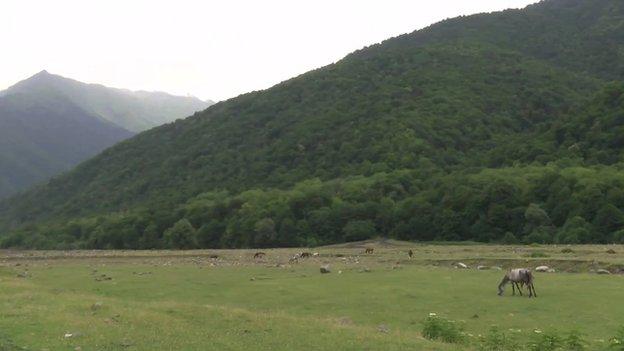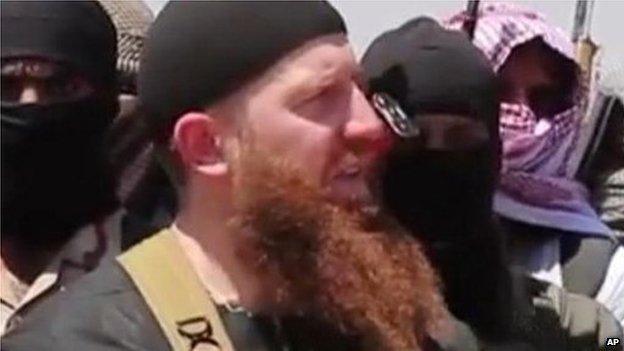The Georgian roots of Isis commander Omar al-Shishani
- Published
Teimuraz Batirashvili: "Now he says he left because of his faith, but I know he did it because we were poor"
Omar al-Shishani may now be one of the most feared jihadists in the Middle East, as a commander in the al-Qaeda-affiliated Islamic State of Iraq and the Levant (Isis), but his early life was very different.
He was born Tarkhan Batirashvili and grew up in Georgia's picturesque Pankisi Gorge. He lived in the village of Birkiani, where his father, a Christian, still lives in a small, simply-furnished house.
The jihad in Syria and Iraq was not Shishani's first experience with combat. He previously served with the Georgian army during the war with Russia in 2008.
Tinderbox
But when he became ill and was dismissed from the army, things started to go wrong, Teimuraz Batirashvili says.
He found it hard to get work and was arrested after a raid on his house.
"One night a terrible noise woke me up - someone was banging at the door. It was the police. There was a bench next to the door near the stairs. I used to go past it every day," Mr Batirashvili recalls.
"A policeman called me over and took a box full of ammunition out from under it. He asked me: 'What's this?' and I told him: 'I don't know. It wasn't here before.'"

The Pankisi Gorge boasts bucolic scenery - but gained a reputation as a haven for Islamist militants
Shishani was reportedly accused of storing the ammunition.
But it was when he was sent to prison that Shishani really changed, his father says, adding that he left for Syria after being released early under an amnesty.
Family photos removed
"He said to me: 'Father, no-one needs me here,'" Mr Batirashvili recalls.
Before Shishani left he removed all family photos in the house, in accordance with his strict new beliefs.
"I didn't notice it, but one day when I wanted to look at an album I realised there was nothing left," Mr Batirashvili says.
He says his middle son was also radicalised and has also left the country.
"I have three sons and they all became Muslim. I'm a Christian, I go to church.
"Neither my father nor my grandfather were Muslim. We've all prayed in these sacred places. And these three are Muslim radical preachers," Mr Batirashvili says.

Shishani has appeared in photos and videos released online by Isis-affiliated accounts
The Pankisi Gorge had been an area of suspected militant activity.
Mr Batirashvili says poverty was a factor in Shishani's radicalisation.
"When you're desperate you'll do anything. Now he says he left because of his faith, but I knew he did it because we were poor," he says.
However, he admitted that Shishani's motivations would have changed over time. "Now, yes, money isn't the reason he's leading this war."
Cut off
Now, Mr Batirashvili gets by on his pension with the help of the odd contribution from his eldest son Tengiz, who is still in the village.
He has had only one phone call from Shishani since he left.
Shishani told him he had a Chechen wife. "He said: 'I have a daughter and she looks like you, her name is Sophia.'"
Shishani asked his father if he was still praying. Mr Batirashvili says that when he replied that he was still a practising Christian, his son hung up the phone and never called again.
Among the more religious people of the gorge, Shishani has attracted respect for his actions in Syria, and some locals say that more men from the area have gone to follow his example.
Mr Batirashvili laments his family's new-found notoriety. "What need do I have for this sort of fame? I wish [Shishani] had never left. But maybe that was his fate, to go to war in Syria," he says.
- Published3 December 2013
